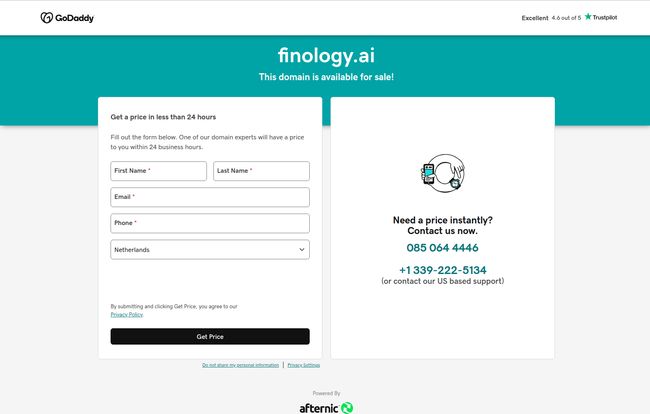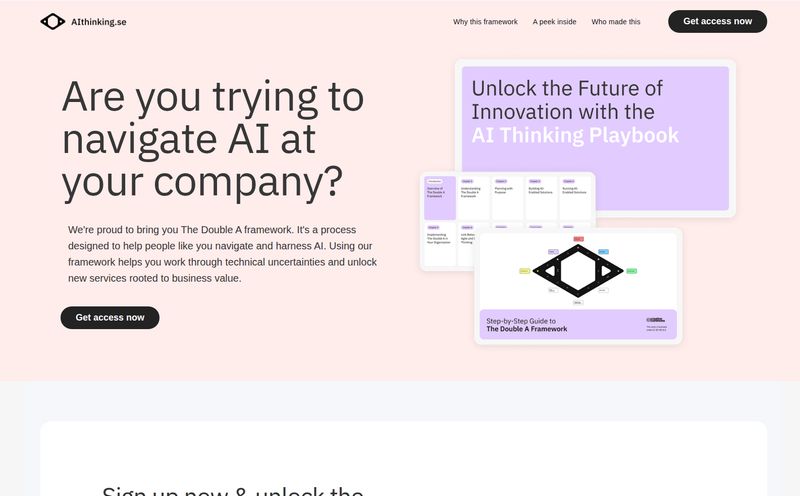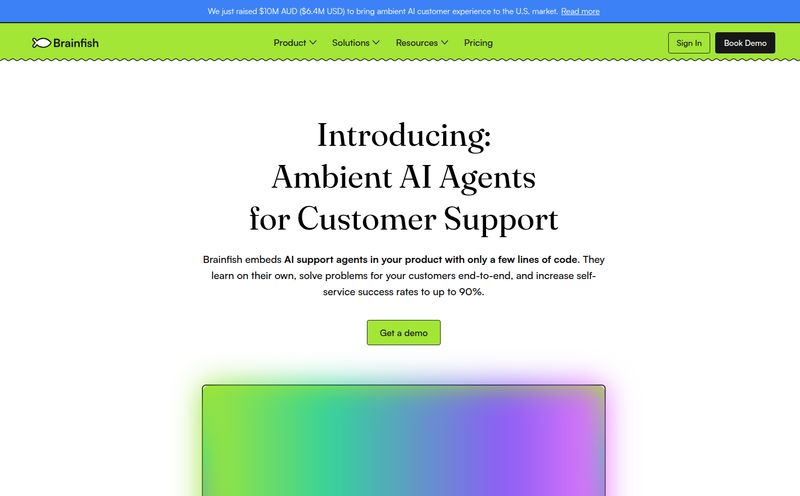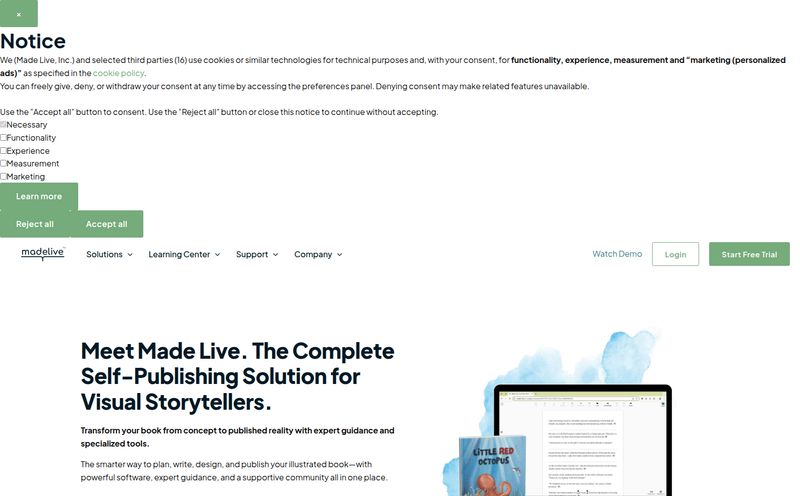No, not the crippling caffeine addiction or the ever-present imposter syndrome. I’m talking about that nagging, low-grade anxiety about cash flow. You know the feeling. It’s that knot in your stomach when you’re staring at a spreadsheet with more tabs than a web browser in 2009, trying to figure out if you can actually afford that new hire or if a surprise invoice will send you spiraling.
For years, we've been promised a savior. A tool that could untangle the mess. Enter the concept of the “AI CFO.” It’s a seductive idea, right? All the brainpower of a Chief Financial Officer, but for a fraction of the cost, living right in your browser. And recently, a name that kept popping up on my radar was Finology.ai.
It promised everything we’ve been looking for: real-time cash flow, smart recommendations, and mistake-spotting magic. I was genuinely excited. This could be a game-changer for so many entrepreneurs I know. But when I went to check it out, ready to dive in... I hit a wall. A very strange, GoDaddy-branded wall. And that, my friends, is where this review gets a little weird.

Visit Finology
What Exactly Was Finology.ai Supposed to Be?
Before we get to the mystery, let's talk about the dream. Based on the digital breadcrumbs it left behind, Finology.ai was designed to be an AI-powered brain for your business finances. The core idea was to plug into your financial accounts and transform that chaotic stream of data into something you could actually use. Think of it less as an accountant doing your taxes and more like a financial strategist sitting shotgun with you, every single day.
The goal wasn’t just to show you numbers you already had, but to give you clarity and confidence. It aimed to be the bridge between raw data and smart decisions, helping small businesses navigate the choppy waters of financial management with a bit more certainty.
A Look at the Promised Features
So what was under the hood? Finology was built on a foundation of some pretty compelling features that, frankly, a lot of us in the small business world desperately need.
Real-Time Cash Flow Visibility
This is the big one. For any small business, cash flow visibility isn't just a metric; it's the air you breathe. Most of us are stuck looking in the rearview mirror, analyzing last month's numbers. Finology promised a live dashboard. It's the difference between driving with a constantly updated GPS telling you about traffic ahead versus using a tattered paper map from 1998. One helps you avoid disaster; the other tells you where you went wrong after you've already crashed.
AI-Powered Analysis and Mistake Detection
Here’s where the “AI” part really comes into play. The platform was designed to be your financial watchdog. It would automatically scan for things a tired human eye might miss—duplicate invoices, unexpected subscription hikes, unusual spending patterns, you name it. I once paid a SaaS subscription for six months after we stopped using the tool simply because I forgot to cancel it. It’s a stupid, costly mistake that this kind of automated detection is built to prevent.
Actionable Recommendations and Forecasting
Data is useless without action. The real power of an AI CFO isn't just spotting a problem, but suggesting a solution. Finology was meant to provide actionable recommendations. Instead of just saying “Your burn rate is high,” it would ideally say, “Your burn rate is high because of X, Y, and Z. Consider renegotiating with vendor X or pausing subscription Z to extend your runway by 3 weeks.” That's not just data; that's decision support. It’s a move from descriptive analytics (what happened) to prescriptive analytics (what you should do).
Personalized Support from Experts
This was a really interesting wrinkle. A lot of AI tools leave you feeling like you're talking to a wall. Finology claimed to offer personalized support from actual financial experts. This hybrid approach is smart. It bridges the gap between cold, hard tech and the nuanced advice a real human can provide. It's a safety net for when the AI's recommendation feels a bit… off.
The Good, The Bad, and The AI
Even as a concept, Finology had clear strengths and some predictable hurdles. Let's break them down.
On the plus side, the potential to simplify complex financial data is a massive win. It promised to take the terror out of financials for creative founders or anyone who didn't major in accounting. Getting real-time insights and concrete suggestions for improving cash flow and profitability is the holy grail. It’s about working on your business, not just in it.
However, there are always trade-offs. The first is the big one: you have to connect your financial accounts. For many, this is the trust fall of fintech. Handing over the keys to your financial kingdom requires a huge leap of faith in the platform's security. Then there's the GIGO principle—Garbage In, Garbage Out. The AI is only as good as the data it’s fed. If your bookkeeping is a mess, the AI's recommendations will be a mess too. And let's be real, no AI is a crystal ball. Its advice should be a guide, not gospel. You still need your own business acumen to make the final call.
So, What's the Price? And… Can You Even Get It?
And here we are. The big question. As I was researching, I couldn't find a pricing page. This isn't a huge red flag on its own; many B2B platforms prefer a “Contact Us for a Demo” approach. Annoying, but standard.
But this was different. When you go to finology.ai, you don't get a landing page. You don't get a waitlist. You get a GoDaddy and Afternic splash page that says, in no uncertain terms: “This domain is available for sale!”
Well, that's a plot twist.
What does this mean? It's hard to say for certain, but we can speculate. It could mean the company pivoted to a new name. It could mean they were acquired and the product was absorbed or discontinued (an “acqui-hire”). Or, in the harsh reality of the startup world, it could mean they simply ran out of runway and had to shut down, selling off their digital assets. Whatever the reason, as of right now, it seems Finology.ai as a service is a digital ghost.
Viable Alternatives to the Finology Concept
While the specific tool may have vanished, the need for it certainly hasn't. If you were excited by the idea of an AI CFO, don't despair! The space is heating up. Here are a few alternatives that tackle similar problems:
- QuickBooks Online: The 800-pound gorilla. Its cash flow forecasting tools have gotten much better, and it remains the accounting backbone for millions of businesses.
- Digits: This is a fascinating one. It's heavily focused on AI-powered analysis and reporting, aiming to give you a live, dynamic understanding of your business finances. It's probably the closest in spirit to what Finology promised.
- Xero: A beautiful and user-friendly accounting platform that's a major competitor to QuickBooks. It has robust reporting and a great ecosystem of connected apps for more advanced forecasting.
- Helicap: While more focused on the lending and investment side for SMEs in Southeast Asia, it showcases the power of AI in financial decision-making on a larger scale.
Frequently Asked Questions about AI CFO Tools
Is it safe to connect my bank accounts to an AI finance tool?
This is a valid concern. Reputable platforms use bank-level, read-only encryption (often through third-party services like Plaid) to protect your data. They can't move money, only analyze the transaction data. Always check a platform's security protocols before connecting anything.
Can an AI CFO replace my human accountant?
No, not really. Think of an AI CFO as a daily financial fitness tracker and your accountant as your doctor. The AI handles day-to-day monitoring and operational advice. Your accountant handles complex tax strategy, official filings, and high-level structural advice. They are complementary, not replacements for each other.
What's the main benefit of real-time cash flow analysis?
Proactivity. It allows you to see problems—like a potential cash shortfall—weeks or months in advance, giving you time to react by securing a line of credit, pushing a sales campaign, or cutting costs. It changes your entire posture from reactive to proactive.
How much do AI CFO tools typically cost?
It varies wildly. Some basic features are being built into existing accounting software like QuickBooks. More dedicated platforms can range from around $50 to several hundred dollars per month, depending on the complexity of your business and the level of support offered.
So what do you think really happened to Finology.ai?
My gut feeling? It was a promising startup that, for one reason or another, didn't make it to the finish line. This is incredibly common. The idea was solid, but execution and funding are everything. It serves as a good reminder that in the world of tech, even the best ideas face a tough road.
My Final Thoughts on the Finology Puzzle
The story of Finology.ai is a fascinating one. It represents a perfect solution to a very real problem. The promise of an intelligent, affordable, and proactive financial partner is exactly what the modern small business needs to not just survive, but thrive.
While this particular tool seems to have faded into the digital ether, don't be discouraged. Its ghost tells us where the industry is heading. The demand for these tools is only growing, and more and better platforms are emerging to fill the void. The dream of the AI CFO is alive and well, even if Finology.ai is not. Keep your eyes peeled, because the right tool for you is out there—you just need to find one with a working website.



